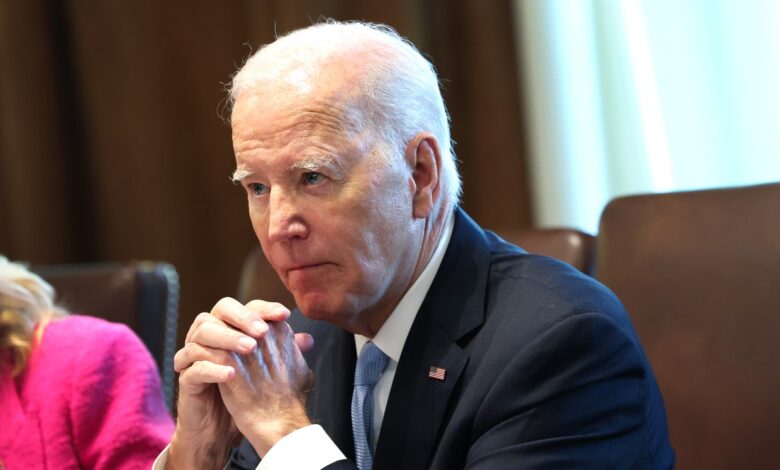Joe Biden’s “Pro-Union” Promise Is Being Fiercely Tested in Detroit

The deadline is Thursday at 11:59 p.m. More than 100,000 members of the United Auto Workers, the biggest auto union in America, will find out whether they’ve won anything close to the four-year contract with a 46% wage bump they’ve been demanding, or whether they will be launching a historic strike. Detroit’s Big Three automakers—Ford, General Motors, and Stellantis, the successor to Chrysler—might be forced to shutter factories just as the industry struggles to rebound from the pandemic.
Joe Biden has a lot at stake too. A ten-day strike could cost the economy an estimated $5 billion. But the ramifications for the president extend far beyond the particulars of how the immediate negotiations play out. Biden, who recently declared himself “the most pro-union president in American history,” has been lining up the support of major labor unions for his 2024 reelection campaign—with the glaring exception of the UAW, which has pointedly withheld an endorsement. When Biden, over Labor Day weekend, said he didn’t think a strike would happen, the UAW’s new president, Shawn Fain, threw a brushback pitch. “I think a strike can reaffirm to him where the working class people in this country stand. And, you know, it’s time for politicians in this country to pick a side,” Fain told CNBC. “Either you stand for a billionaire class where everybody else gets left behind, or you stand for the working class.”
A Democratic operative close to the issue tells me that Fain’s forceful flexing of leverage caught the Biden team somewhat off guard. The president has tried to walk a tricky line when it comes to the auto industry: Two of his prized legislative achievements—2021’s infrastructure bill and 2022’s Inflation Reduction Act—included hefty financial incentives for companies that invest in electric-vehicle plants. That angered the auto unions because fewer workers are needed to build EVs than traditional cars, and because most of the batteries needed for EVs are manufactured either overseas or in non-union American factories.
The administration tried playing catch-up in August, announcing $15.5 billion in funding and loans, the bulk of the money targeted at converting existing auto plants to EV facilities and retraining union workers. As you might expect, his presumed 2024 Republican challenger is trying to make mischief. “Biden’s Electric Vehicle mandate will murder the U.S. auto industry,” the Trump campaign claimed last week, “and kill countless union autoworker jobs forever.”
The dealmaking in Detroit is only one part of a wider struggle between workers, industry, and Washington politicians as technology reshapes the economy. Much like EVs, artificial intelligence is also a major point of contention—but in Hollywood, where studios and striking writers and actors have been locked in a months-long standstill. “The question is, Who is going to have the balance of power? Who is going to have control over these things and make money from them?” says Alex Colvin, the dean of Cornell’s School of Industrial and Labor Relations. “This is a critical period.”
For political alliances as well. Democrats have spent years chasing white working-class voters, mostly in vain. In 2020, Biden won back a crucial share of them in Pennsylvania, Wisconsin, and Michigan. Union membership rates in states like these remain at a historic low, but there are signs of a shift in momentum, with organizing efforts at Amazon warehouses and Starbucks stores as well as behind the Uber and Lyft wheels. Not to mention: the economic and racial mixture of unions has also grown more diverse. How Biden navigates all of these labor currents will have a big impact on what are likely to be close races in 2024 battleground states.
“We’re clearly seeing an upsurge of worker activity with an understanding that technology, whether it’s AI or other impacts on their workplace, is changing their leverage with employers,” says Neal Kwatra, a Democratic strategist who has worked with both labor unions and elected officials. “There are definitely some Democratic elected officials around the country who are pro-worker, who are pro-union, who are finding ways to be concretely and substantively helpful to these workers’ struggles. But I do not think the party as a whole understands the moment that we are in.”
One Democrat who clearly gets it is Elissa Slotkin. “What I’ve said to my friends and supporters in labor is, if we don’t use this moment, shame on us. You’re seeing that with UAW right now,” says the Michigan congresswoman, who is running to become one of Michigan’s US senators. “We’ve got to make sure that people at these new [EV] factories are paid a living wage. That’s what just went on in Lordstown—they unionized and they’re leveraging that affiliation for more money, more benefits. We have to get that right. But in terms of who is supporting policies that are pro-union, there is only one party doing that. I know Donald Trump has made electric vehicles his new ‘woke’ culture war. Those vehicles are going to be made. And I am always going to pick Team America over Team China making those damn vehicles.”
In the past year Biden has dodged three labor bullets—standoffs at UPS, West Coast ports, and in the freight railroad industry, all of which could have blown holes in the economy, ended in agreements, not strikes. Maybe he’ll get lucky again in Detroit tonight. Earning the votes of union members next year, though, is still going to take a lot more than luck.




